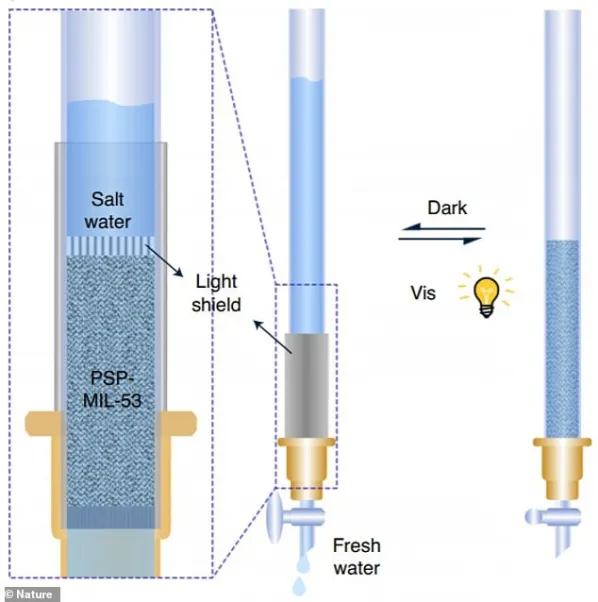'Light receptive' modern technology transforms salt water right into tidy alcohol consumption water in less than 30 minutes
- New technology purifies water making use of sunlight making use of a metal-organic framework
- These so-called MOFs separate the salty solute found in brackish and also salt water
- The concept could offer potable water for countless people throughout the world

Scientists have actually created new innovation that can transform seawater into clean alcohol consumption water in less than 30 mins.
Australia-based scientists used a metal-organic framework (MOF), a sort of lattice-like crystal, to desalinate water.
The hollow structure of pores separates the salted solute within the brackish water or perhaps saltier salt water, in a procedure referred to as molecular sieving.
Under dark conditions, the MOF adsorbs salts as well as other contaminations in the water in 30 minutes. The MOF itself is then restored for reuse in just 4 minutes, making use of sunshine to eliminate the adsorbed salts.
The light-responsive MOF was utilized to filter hazardous bits from water as well as produce 139.5 litres of clean water per kilogram of MOF per day.
Scientists state their technology is more energy-efficient way than existing desalination techniques, consisting of reverse osmosis, and can supply safe and clean water for millions internationally.
Water deficiency is just one of the biggest international risks in the upcoming years, according to the Globe Economic Forum (WEF).
Thermal desalination processes by dissipation using solar energy are extensively made use of to create fresh water, yet can be very energy extensive.
' Sunlight is one of the most plentiful and also renewable source of energy in the world,' stated Teacher Huanting Wang from the Division of Chemical Engineering at Monash University in Australia.
' Our advancement of a new adsorbent-based desalination process via the use of sunlight for regrowth gives an energy-efficient and also environmentally-sustainable option for desalination.'
Desalination-- the process of turning undrinkable saline or salted water into drinkable water-- has been used to attend to escalating water shortages internationally.
' As a result of the availability of brackish water and seawater, and also because desalination procedures are trusted, cured water can be integrated within existing water systems with very little wellness risks,' Professor Wang said.
The World Health and wellness Organisation recommends good quality alcohol consumption water ought to have an overall liquified solid (TDS) of less than 600 components per million (ppm).
Monash scientists were able to achieve a TDS of less than 500 ppm in simply half an hour as well as restore the MOF for reuse in four mins under sunlight by quickly launching the adsorbed salts.
MOFs were uncovered in the 1990s and also might have prospective for usage in hydrogen storage space, solar power as well as even mopping up harmful gasses from the air.
They are a class of compounds including steel ions that form a crystalline material with the biggest surface area of any kind of product recognized.
They are so porous that they can fit the whole surface of a football field in a tsp.
The study team developed a committed MOF called PSP-MIL-53, which is photoreversible, indicating its functions can be changed from one to the other by light.
PSP-MIL-53 was synthesised by presenting poly( spiropyran acrylate) (PSP) into the pores of MIL-53-- a specialised MOF well-known for its breathing effects as well as transitions upon the adsorption of molecules such as water as well as co2.
PSP-MIL-53 was able to generate 139.5 litres of fresh water per kg of MOF each day, with a low energy consumption, sourced from a river, lake or aquifer.
' This research study has successfully shown that the photoresponsive MOFs are an encouraging, energy-efficient, and also sustainable adsorbent for desalination,' Professor Wang claimed.
' Our work offers an interesting brand-new course for the design of useful materials for making use of solar energy to minimize the power demand and improve the sustainability of water desalination.
' These sunlight-responsive MOFs can possibly be further functionalised for low-energy as well as environmentally-friendly methods of drawing out minerals for lasting mining and other associated applications.'
Thermal desalination processes by evaporation are usually energy-intensive, while other innovations like reverse osmosis have some disadvantages.
In reverse osmosis, water, consisting of liquified salt molecules, is required via a semi-permiable membrane layer filter.
Bigger salt particles do not make it through the membrane layer holes, yet the smaller sized water molecules do.
Reverse osmosis is a reliable ways to desalinate briny water, but it is more pricey than various other methods and also has high energy usage.
Also read
- UbiQD Secures Landmark Quantum Dot Deal with First Solar
- Astronergy Invests $53M in Tandem Solar Cell Project
- ARENA Unveils $39M Solar Innovation Funding Round
- CNNP Optoelectronics brings utility-scale perovskite modules out of the lab
- Low-Temperature Sequential Deposition Lifts Inverted Perovskite Solar Cells Efficiency Record
